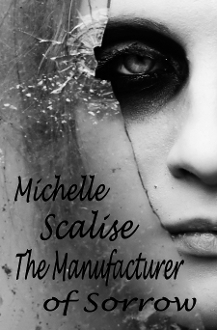 I love poetry and I love horror. Unsurprisingly, I have a soft spot for horror poetry. Unfortunately, like many expressions of horror, the amount of subpar work by cheap, gimmicky hacks makes the entire genre I adore look like shit. Because of that, I tend to be pretty damn harsh on poetry. Unless I like it, then I glow like a worm on Christmas eve and spew my joy all over you (yes, the pathetic imagery was intentional). It’s worth keeping that in mind while I talk about Michelle Scalise’s The Manufacturer of Horror.
I love poetry and I love horror. Unsurprisingly, I have a soft spot for horror poetry. Unfortunately, like many expressions of horror, the amount of subpar work by cheap, gimmicky hacks makes the entire genre I adore look like shit. Because of that, I tend to be pretty damn harsh on poetry. Unless I like it, then I glow like a worm on Christmas eve and spew my joy all over you (yes, the pathetic imagery was intentional). It’s worth keeping that in mind while I talk about Michelle Scalise’s The Manufacturer of Horror.
After reading the first few poems, I set the book aside. There was some solid imagery and I was getting a sense of a strong emotional core, but that was buried under language that was too self-conscious and clunky with little to no sense of rhythm. Those problems tend to kill poetry for me, drawing my attention to the individual words instead of losing myself in the connections between them.
Luckily for me, I picked it up again and “Cat”, which deals with the loss of a child via mythology, hit me right where it needed to. The flow pulled me along effortlessly, the images were sharp and the heart was laid bare. The same goes with the immediate followup, “Blue Rose Tattoo”.
From that point, the reading got much better. There are still several moments where Michelle lets the words get away from her, but the work becomes much stronger from that point onward. By the last third of the book, every single poem just goddam nails it. “Close the Door” is a deft dance of fear and desire intertwined, “Posthumous Voices” winds and wraps and tickles its way into the worst parts inside and “Her Little Blue Pills” just plain kicked my ass.
There are quite a few damn fine poems here that straddle that razor line of taking nightmarishly specific horrors and translating them into a universal experience in a way that breathes naturally and many of the others simply have a line or two that throw the experience for me. The good definitely outweighs the bad and the great is some serious shit, especially for the price (currently $4.84 from the publisher). It just makes me sad that I was almost completely put off by the placement of some of the worst poems available here right at the start of the book. Skip to “Cat” and you’ll do well by yourself.
Cover art: Picture covers usually don’t do anything for me, but I have to admit to something evocative of the image. Designer Eleanor Bennett uses an image that distinctly feminine sense of loss and disquiet with a slight touch of rage that pervades the work within. However, as tends to be a common problem with picture covers, the title and byline look disconnected from the artwork. The effect is like something done in MSpaint and makes the whole appear less professional.
 Horror News | HNN Official Site | Horror Movies,Trailers, Reviews
Horror News | HNN Official Site | Horror Movies,Trailers, Reviews